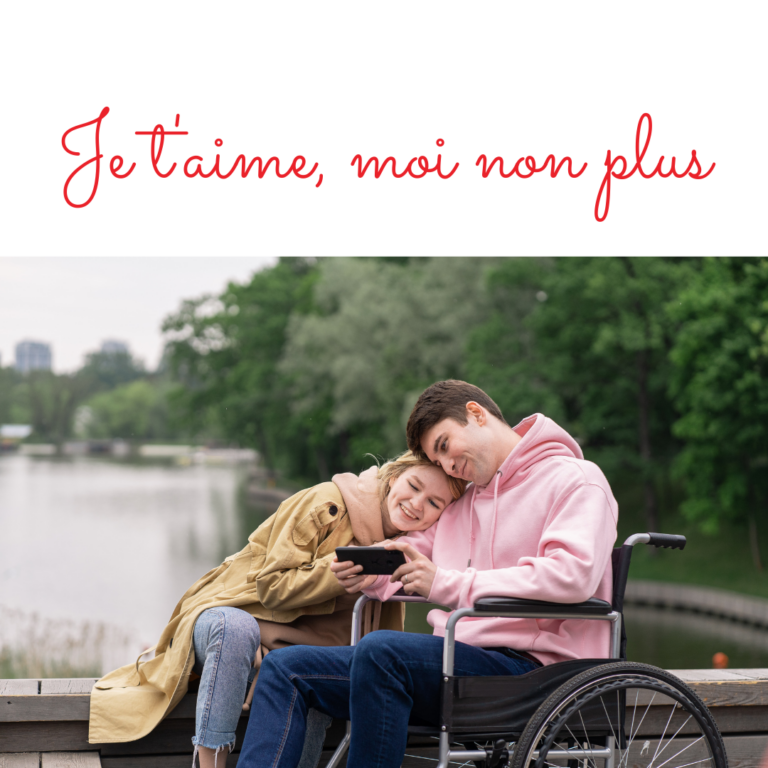Choosing Love
A title that could make you think of the next summer hit, making all lovers dance slowly whether standing, sitting, or lying down. Sadly, no—it’s just the advice of Emmanuel Macron, the incumbent president running for re-election, to Lucie Carrasco, a young woman with a disability, during a live broadcast on France Info on April 15th. This signaled his backpedaling on the thorny issue of decoupling the Disabled Adult Allowance (AAH) from spousal income, which he himself had previously called an “absurd guillotine.”
Is this pure cynicism, electoral opportunism, or a genuine realization of one of the most brutal social injustices that was fiercely defended less than a year ago by Macron’s government against the entire opposition at the National Assembly?
Is this pure cynicism, electoral opportunism, or a genuine realization of one of the most brutal social injustices that was fiercely defended less than a year ago by Macron’s government against the entire opposition at the National Assembly?
A symbolic one-euro question, which I propose to unravel here.
WHAT IS THE AAH ?
The AAH, or Disabled Adult Allowance, was created in 1975 to compensate for the inability of people with disabilities to work. It is a financial aid provided by the state, subject to criteria such as incapacity, age, residence, and income, guaranteeing disabled people a minimum income, recently raised to €919.86 as of April 2022. This allowance, which remains below the poverty line, is intended for over a million people in France.
Should I follow my heart and get married, risking becoming a burden, physically and financially dependent, or should I preserve my dignity and independence as a woman?
Disabled adults living alone or with their parents are not at risk of seeing their allowance reduced or eliminated. However, the moment they dare to enter into a relationship, their allowance is calculated based on their partner’s income, placing them in a double or even triple state of dependence—physical, emotional, and financial. They are thus faced with a heartbreaking choice between the dream of love and the need for autonomy, while also grappling with the additional costs that come with their disability.
TESTIMONIAL
I personally knew a couple where the husband, who was blind, suddenly lost his AAH because his wife, a nurse, finally secured a permanent position at a public hospital after years of temporary work. When the family benefits office (CAF) explained to him that he was no longer eligible for his allowance due to his wife’s salary exceeding €2,200, his only recourse was to ask her to resign from her job. Already struggling with the idea of being dependent on his beloved on a daily basis, adding financial dependence was, for him, an “absurd guillotine,” to borrow President Macron’s words. The woman in question had asked for my help to find a solution that would maintain her husband’s AAH, but neither I nor anyone else could offer a solution to satisfy this man’s desperate need for dignity. The couple eventually divorced, and misfortune never comes alone: he passed away less than two years later during the coronavirus pandemic, due to disorientation, isolation, inadequate care, and heartbreak.
This is just one example of many that motivated me to sign and widely promote the petition that garnered over 100,000 signatures in 2021, advocating for a demand raised for years by numerous disability collectives and associations. This led to Bill No. 805, proposing the removal of spousal income from the calculation of the AAH. A bill unanimously supported by all opposition parties, except for Macron’s government, which rejected it outright during the second reading in the Senate.
Yes, Mr. President, it is indeed an absurd guillotine.
Because for many, it is a matter of survival with permanent disabilities that, in addition, incur costs from which we, people with disabilities, cannot escape;
Because everyone deserves to live a fulfilling life, and having a disability does not disappear when we enter a relationship. Therefore, the AAH cannot be compared to other social welfare benefits;
Because autonomy is a central issue for us, people with disabilities; and France has commitments to international bodies that should be respected to be consistent with your speeches.
If a tense electoral context between two rounds of voting can speed up awareness of this social justice issue, how about making space for people with disabilities in high-level decision-making bodies instead of settling for tokenistic representation?
*Family Allowance Office (CAF)
